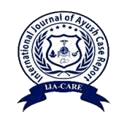A Case Study on Ayurvedic Management of Ashmari (Renal Calculi)
Abstract
Calculi has been mentioned in ayurvedic writings for a very long time as Ashmari a condition known as Ashmari affects the urine system (Mutravahasrotas). In Ayurveda, mutrashmari is classified as Asthamahagad, which means "difficult to cure." Ayurvedic classical texts have described symptoms of this condition, including Jwara (fever), Basti Pida (discomfort and pain in the bladder), Aruchi (anorexia), Mutrakriccha (difficulty in micturition), Bastishira Vedana (pain in the urethra), Mushka Vedana (pain in the testicles), and Shepha Vedana (pain in the penis). A male patient 46 year old who was complaining of pain in bilateral flank region, burning urination went to the OPD. Multiple calculi was seen in bilateral kidney (3 on right and 2 on left side, largest measuring 8.0 mm in right kidney and 8.0 mm seen in left upper ureter) discovered by the USG along with normal vital signs. Treatment was given to the patient was Chandraprabha Vati -1000mg two times a day, Gokshuradi Guggulu 1000mg three times a day, Yavkshara 500mg two times a day , Varun Shigru kashaya 50ml two times a day on OPD basis. The patient was instructed to follow up initially after 15 days and then every 20 days. The patient was counselled to adhere to dietary and lifestyle limitations in addition to taking medicine. The patient's signs and symptoms improved, and there was no trace of calculi in the both kidney, according to the USG report after 5 months.

This work is licensed under a Creative Commons Attribution-NonCommercial-NoDerivatives 4.0 International License.

